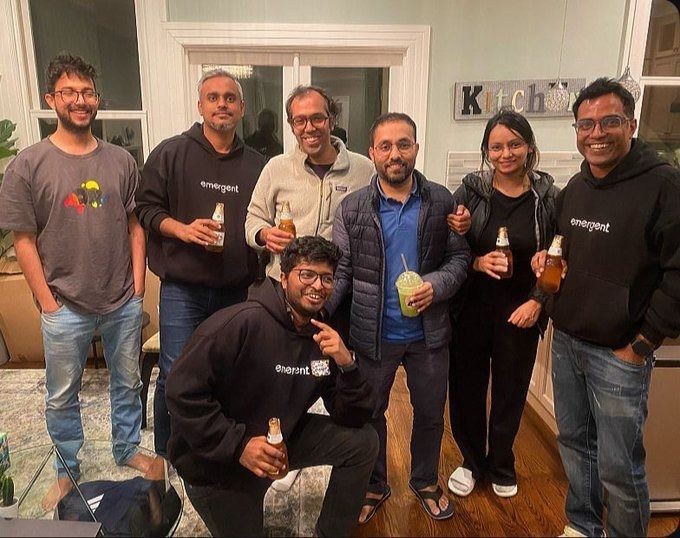$10M ARR. 2 months. This Startup Is Writing the New AI Playbook

2 months. That's all it took for Emergent to achieve what most software startups only dream of: $10 million in ARR, 900,000+ apps built, and users and customers across 184 countries. And this isn't another Silicon Valley success story. This is the story of two founders, twins and all, from India who are redefining what it means to build software — and putting India on the global map of AI infrastructure powerhouses.
Not long ago, building a software product required assembling a full-stack engineering team, months of planning, and navigating integration nightmares. Then came the large language models (LLMs), promising that people could simply describe what they wanted and watch magic happen on screen. Yet most AI ‘build-anything’ tools remained trapped in the demo phase — impressive for presentations or prototyping, but incapable of creating production-ready applications.
This gap between promise and reality is where Mukund Jha and Madhav Jha saw opportunity. The brothers, with their deep technical backgrounds spanning Google search,Amazon deep learning, and successful startup ventures, recognized that the problem wasn't just about generating code — it was about orchestrating entire development teams. Where others offered coding assistants, they envisioned an autonomous development team.
Systems, not snippets
Emergent represents a fundamental shift in how we think about AI-powered development. Rather than offering another coding copilot that developers write better code, Emergent functions as a complete product engineering team via its vibe coding platform. The platform incorporates multi-agent systems: specialized AI agents working in concert like a team of engineers, designers, developers, and product managers.
Emergent stands out as they built an entire new multi-agent architecture completely from ground up - solving some of the hardest problems in building reliable agents. Breaking silos and getting AI agents to work together with cross-file reasoning and contextual understanding – from idea to software, with no code for the end user.
This systems-thinking approach enables the platform to deliver not just code, but complete applications with real databases, working APIs, secure authentication, long term memory and production-ready infrastructure.
The market response to Emergent has been unprecedented. In just ten weeks since its public launch, the platform has achieved metrics that typically take years to accomplish. The numbers tell a compelling story: 900,000+ applications built across diverse use cases.With more than 20+ Billion lines of code generated and adoption spanning 184 countries, Emergent has demonstrated global appeal from solo-founder-users to enterprise GTM teams. Built by entrepreneurs, product leaders, agencies, and non-technical teams, these applications span:
- AI-powered tools :from conversational apps to intelligent automation.
- Consumer and personal productivity apps: enhancing everyday efficiency.
- Specialized SaaS solutions: CRMs, inventory management, and accounting systems.
- Industry-specific platforms: for education, healthcare, finance, electric vehicles, aviation, and more.
- Business productivity tools: internal dashboards, analytics platforms, and ecommerce workflows. including AI Apps, CRMs, dashboards, internal tools, analytics products, SaaS prototypes, ecommerce workflows, and so on.
Emergent has achieved this with a lean team of just 12 Engineers operating with the efficiency of a 100-person company and requiring zero paid marketing — entirely driven by product-led growth.

Mukund, after completing his Computer Science masters at Columbia University with a focus on machine learning and NLP, joined Google's Search Quality team — gaining exposure to cutting-edge AI systems and global-scale product development. His subsequent experience co-founding Dunzo, India's first Google-backed startup, pioneered hyperlocal quick commerce building one of the most beloved consumer brands in the country. Madhav (Maddy) is a technology leader and an AI researcher. He started the deep learning team at Amazon.
The duo started Emergent in Sep 2024.
When we first met Mukund and Maddy, they didn’t pitch us a deck.They pitched us a runtime. They weren’t building wrappers — they were building infrastructure. While VCs were still arguing whether infra startups could come out of India, Emergent was already laying the foundation to build a global company
We led a $7 million seed round before the duo went to YC, not because the market loved it yet, but because we did. What we saw was rare: Speed with taste, infra with empathy, code generation with structure, global product thinking, built on Indian DNA. Emergent is used not just by developers, but by sales teams, marketers, operations leads, and founders who’ve never written a line of code.
The India advantage
Emergent's success represents a broader transformation in India's technology landscape. For decades, India served as the world's IT back office. Today, the country is emerging as a source of AI infrastructure that powers innovation worldwide. India's AI market itself is projected to reach $17 billion by 2027, growing at 25 percent annually.
The government's IndiaAI Mission, with its Rs. 10,000 crore budget and plans for 18,000 high-end GPUs (which may go up to as many as 50,000 via public-private efforts), signals serious commitment to building domestic AI capabilities. This infrastructure investment is creating the foundation for companies like Emergent to compete globally while retaining an Indian heritage.
Bengaluru alone, India’s unofficial tech capital, has over a million tech professionals. It is emerging as one of the top 12 global tech powerhouse cities, and now rivals Silicon Valley in AI talent density. The city hosts 28 unicorns and attracted $3.3 billion in venture capital across 140 deals in 2024, including 34 AI-focused investments.
Chennai, Hyderabad and Pune are other hot Indian tech destinations competing with global hubs. Future AI leaders won’t just come from SF or Tel Aviv. They’ll emerge from all of these Indian cities.
The company’s early success signals a broader transformation in global AI leadership. While the US and China have dominated AI development through massive corporate investments and government initiatives, India is carving out a distinct position focused on practical, scalable solutions that address real-world problems.
The success of Emergent and other successful globally oriented AI companies from India, including from Together’s portfolio, is creating a flywheel effect. As Indian AI companies demonstrate global success, they attract more talent, investment, and attention to the ecosystem.
This momentum, combined with strong technical education infrastructure and government support, positions India as a credible, rising player in global AI development over the coming decade.
As Mukund and Maddy continue building Emergent, they're not just creating a successful company — they are writing the playbook of building a global AI infrastructure company. With offices in San Francisco and Bangalore, their story represents the beginning of what could be India's defining decade in tech, transitioning from service provider to innovation leader in the AI age.
As for Emergent, if this is what 10 weeks looks like, we can’t wait to see what the next 10 years bring.


